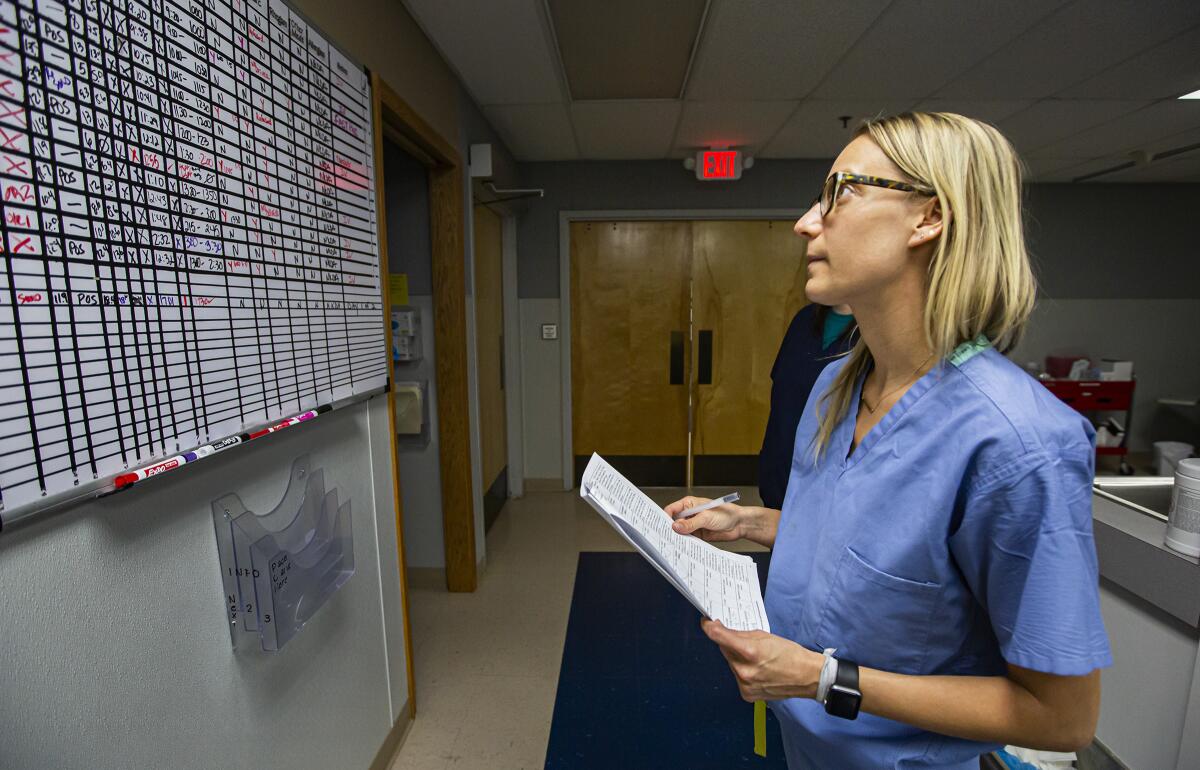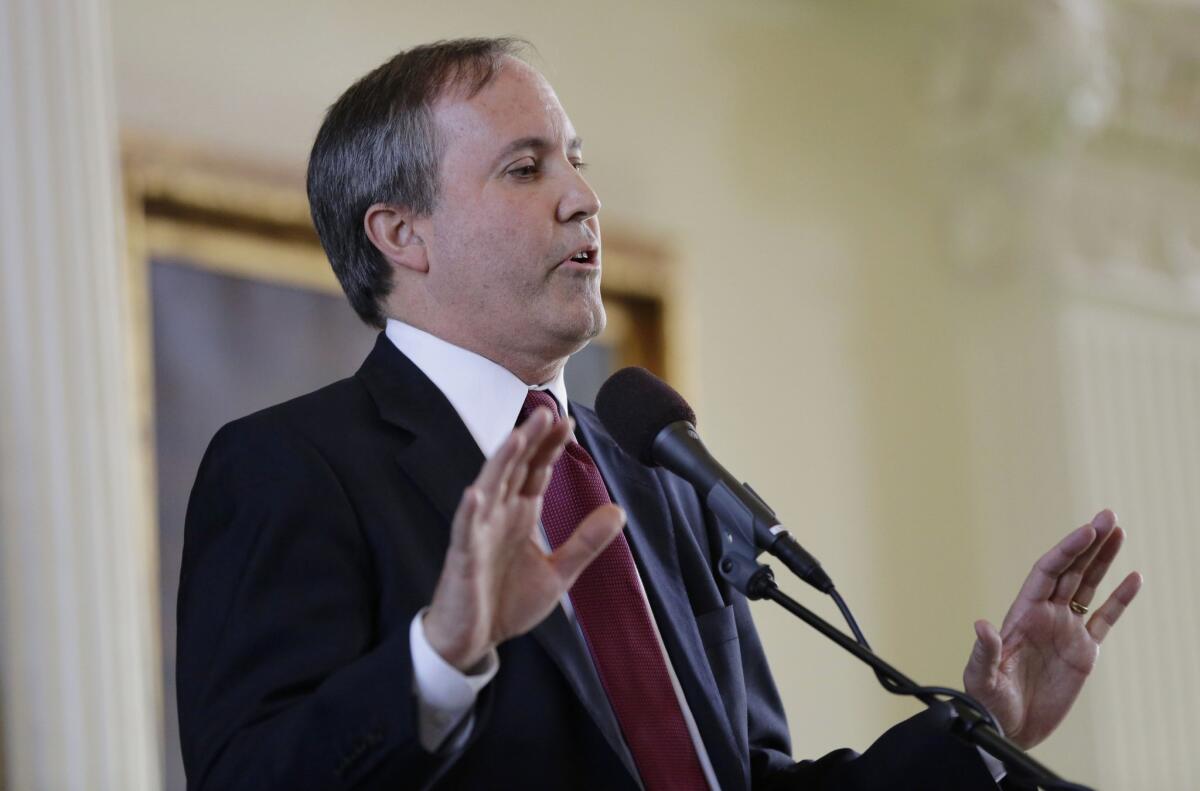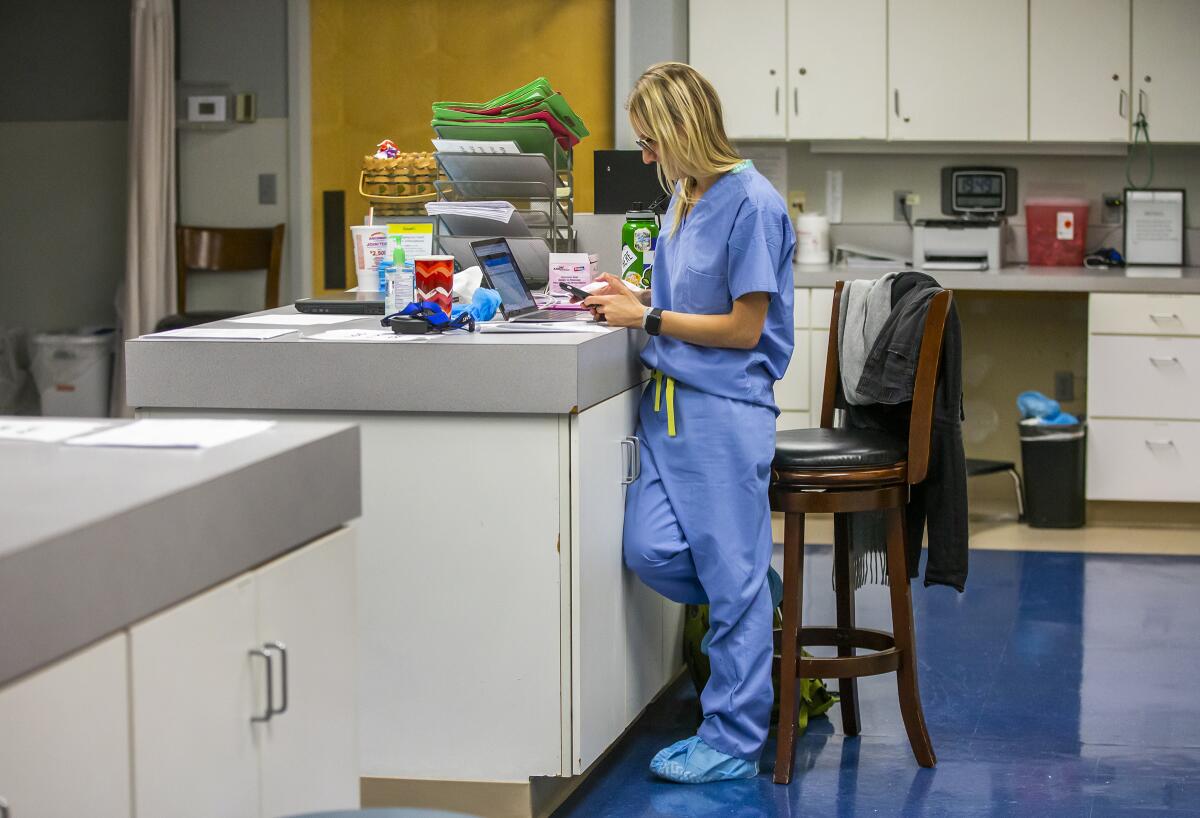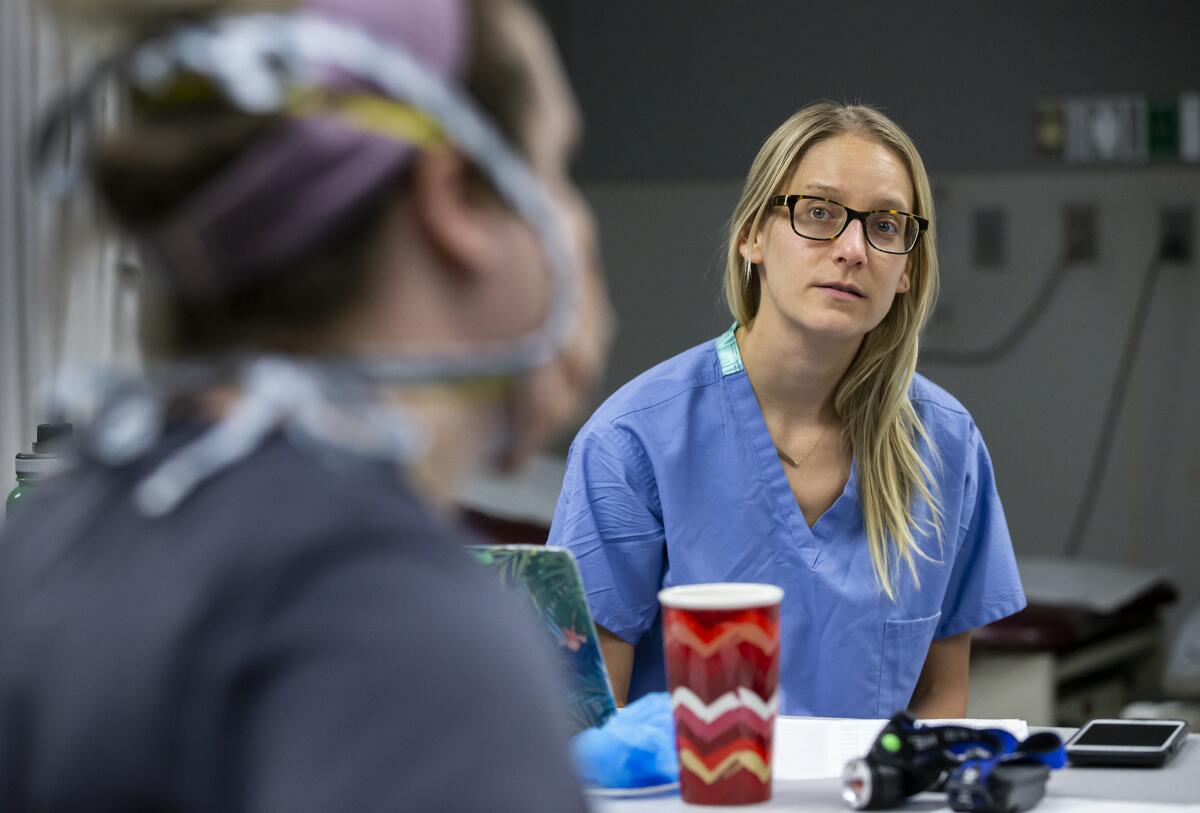Abortion during coronavirus: State bans, closed clinics, self-induced miscarriages

- Share via
WICHITA, Kan. — Right after she was laid off from her medical job because of the coronavirus outbreak, a single mother of two in north Texas found out she was pregnant.
The next day, when she called to make an appointment at a local abortion clinic, staff told her it had closed — and no other clinic in the state could provide her an abortion, either.
“They told me the governor had put a halt on it,” said the woman, who asked to be identified by her first name, Kris, after driving 350 miles north to a clinic in Wichita, Kan., this week, crying and trembling with anxiety.
“I just feel like the state of Texas has taken away a fundamental right of mine,” she said.
More than half a dozen states have tried to ban abortion during the coronavirus outbreak as an elective procedure. Texas abortion providers sued to block the bans, appealed to the U.S. Supreme Court, but withdrew their appeal this week after a circuit court allowed some abortions to proceed. Providers in Arkansas and Tennessee also sued to stop bans there this week, which could end up at the high court. Meanwhile, women whose appointments have been canceled have tried to self-induce miscarriages or driven hundreds of miles to out-of-state clinics, expensive and risky travel.
Texas Gov. Greg Abbott and other state officials insist abortions — even medication abortions that involve clinic staff dispensing pills — are elective procedures that require gloves and other protective medical equipment needed elsewhere during the pandemic.
“Abortion has been touted as a ‘choice’ by the same groups now attempting to claim it is an essential procedure,” Texas Atty. Gen. Ken Paxton said in a statement last week in which he vowed “to ensure that hardworking medical professionals receive the supplies and personal protective gear they need to successfully combat this health crisis.”

The bans only added to the challenges abortion clinics have faced during the pandemic.
“We do not have enough staff, we do not have enough doctors, we do not have enough days in the week,” said Julie Burkhart, founder and CEO of nonprofit Trust Women, which operates the clinic in Wichita and another in Oklahoma City. “These anti-choice governors have created a health crisis within a health crisis.”
They and other abortion clinics rely on doctors from out of state whose flights were limited or canceled after the outbreak. Some clinics limited their hours, stopped providing surgical abortions or closed. Others like Trust Women found doctors to volunteer. Staff have to wear added masks and screen potential patients for symptoms of COVID-19. Three times as many patients showed up for appointments in Wichita this week, up to 45 a day, the lowest no-show rate clinic staff can remember. Patients had to be socially distanced in the waiting room. Some had traveled from as far as Austin and Houston — about 600 miles. One woman was homeless, another arrived with just $20. Nonprofit abortion funds helped them pay for the procedure, and have expanded in recent weeks.
Some clinics discourage women from bringing companions because they can no longer enter clinics due to COVID-19, forced to wait outside in their cars where protesters often linger. The fenced Wichita clinic has drawn crowds and even closed for several years after its director, Dr. George Tiller, was fatally shot by an antiabortion extremist. Protesters show up daily and have an office next door. Last week, a group with bullhorns was dispersed by police for violating the governor’s order barring large gatherings. This week they returned, as did a priest praying the rosary and a man with a sign that said, “Children are being murdered here.”
After Abbott issued the Texas order March 22, local abortion providers filed a federal lawsuit arguing that the “pandemic and its fallout do not reduce patients’ needs for abortion; if anything, they make timely access to abortion even more urgent.”
“It just shows how when it comes to reproductive health, we live in two different Americas,” said Amy Hagstrom Miller, president of Whole Woman’s Health, a Texas abortion provider.
Whole Woman’s Health sued Texas in 2013 to block a law that closed more than half the state’s abortion clinics before it was overturned by the U.S. Supreme Court. The latest ban has forced its clinics to cancel hundreds of appointments and send patients as far as the East Coast, some by plane, Hagstrom Miller said, calling it “the biggest uncertainty we have felt in our lifetimes.”
“It’s exposing people to COVID under the guise of protecting their health,” she said. “People are desperate.”
Planned Parenthood of the Rocky Mountains saw twice as many patients from Texas at the end of March because of the state ban, said President and CEO Vicki Cowart. While they have increased telemedicine to provide medication abortions by mail, they can’t do it in Texas.
“COVID-19 is being used as a tool by people who want to see abortion banned,” Cowart said.
Joan Lamunyon Sanford, executive director of New Mexico Religious Coalition for Reproductive Choice, said the number of women seeking help paying for travel to get abortions there has doubled in recent weeks, mostly from Texas. Two weeks ago, a 19-year-old arrived on a Greyhound bus from Louisiana, more than 900 miles away.
New Mexico clinics are booked for the next month, she said, forcing women to wait and have more expensive surgical abortions during the pandemic fiscal crisis.
“People are losing their jobs or they’re worried about losing their jobs, reluctant to take time off work or if they are taking time off work, having to justify it,” she said.
In Texas, Kris, 36, followed the legal battle over the abortion bans daily, trying to predict which clinics were likely to stay open.
“It’s been flipping back and forth,” she said. “Every day has been a nightmare.”
Governors have attempted similar bans in Alabama, Iowa, Louisiana, Mississippi, Ohio and Oklahoma. As state and circuit judges ruled, the Texas ban was lifted, then reinstated in part. Surgical abortions were available this week in Texas only to women nearing the legal limit of 22 weeks. Kris said she “worried I’ll be forced to have this baby.”
She had her first child when she was 17, pressured by Christian friends in her small town not to have an abortion. A year later, she had her second, and raised them both on her own. She later had an abortion, with no delays and no regrets.
This time, she had to make an appointment at a clinic in Fort Worth, then Oklahoma City and finally Wichita, on the recommendation of clinic staff. Kansas Gov. Laura Kelly has supported abortion rights.
“They told me to keep this [appointment] because Oklahoma keeps going back and forth,” she said — most recently when a circuit court Monday allowed clinics to dispense abortion medication.
Kris became pregnant six weeks ago after her boyfriend’s condom broke. They had only dated a few months. She opted for a surgical abortion because she wanted it done as soon as possible, by a doctor, without complications. Before she left for the clinic Monday, she called Kansas and Oklahoma highway patrol to ensure she wouldn’t be stopped for traveling during the pandemic. She stayed at a cheap motel, wiping down surfaces for fear of COVID-19. There were already a handful of virus hot spots in the county surrounding Wichita.
At the clinic, she steeled herself as she took a seat in the waiting room beside a sign that said, “Politicians are not doctors.” To drive herself back to Texas, Kris would have to have the abortion with a milder sedative than is usually used.

“These politicians, they have no idea what it’s like for women in this situation,” she said shortly after arriving. “My life is in other people’s hands, my choice.”
Another Texas woman came to the clinic that day because her husband had just been fired, they paid their mortgage this month with savings and were afraid they might soon become homeless. She had wanted a baby, and cried as she showed the doctor pictures of her 4-year-old son. The doctor wanted to hug her, but couldn’t because of social distancing.
“The pandemic is making these decisions even more complicated for people,” Dr. Angela Marchin said.
On Wednesday, a 22-year-old stay-at-home mother of two traveled to the clinic from the central Texas city of Killeen, where her husband is a soldier based at Ft. Hood. The woman, who asked to be identified by only her first name, Cailyn, said she decided to have an abortion because she would soon have to move: Her husband was about to be stationed in Hawaii in June. Earlier this year, they had paid $10,000 for reconstructive surgery to repair abdominal muscles damaged during her last two pregnancies. She had taken the morning-after pill, but said it didn’t work.
Cailyn unsuccessfully tried to induce a miscarriage with multiple doses of vitamin C, then called two other clinics that referred her to Wichita because of the Texas ban.
“I don’t think it’s fair. If it’s not your body, it shouldn’t be your decision,” she said as she waited to get abortion medication.
Earlier this month, Austin waitress Heather Artrip, 30, had packed her car to drive to New Mexico with her two sons, ages 6 and 9, when a local clinic called to say it had reopened because of a court decision. By the time Artrip arrived the next day, the decision had been reversed, the ban reinstated.
“Turns out now, they can’t,” she said by phone from the clinic. “This is the third appointment I’ve had that’s been canceled due to the bans.”
Artrip, who has a prolapsed uterus that would make pregnancy risky, had also taken the morning-after pill, then tried to induce a miscarriage.
She said the abortion ban was “like slavery, like forced birth.”
“This is my right given to me on a federal level but on a state level I don’t have access. But Hobby Lobby is open because it’s essential. Liquor stores are open. Taco Bell’s open. It just does not add up,” she said.
A week later, when the ban was partially lifted, Artrip was able to get abortion medication at the Austin clinic.
Abortion advocates have mobilized in response to the bans, expanding appointments and paying for women to travel to nearby states. Austin-based Lilith Fund, which operates hotlines for women seeking abortions, increased its average payment by 30% to $363 after the ban, according to executive director Amanda Beatriz Williams.
Beatriz said the average Texas woman seeking an abortion since the state ban has had to travel about 700 miles round trip; one woman traveled to Atlanta.
At the Wichita clinic, the operating room white board was filled with dozens of patient initials, the parking lot replete with Texas license plates. The two doctors who had flown in from out of state worked double time.

“Is everyone from Texas?” said Marchin who, because of limited flights, would have to fly back to Colorado on Wednesday at noon, but seeing as many patients as she could before she had to cut her day short. “This is the most procedures I’ve done in a day.”
More to Read
Sign up for Essential California
The most important California stories and recommendations in your inbox every morning.
You may occasionally receive promotional content from the Los Angeles Times.











